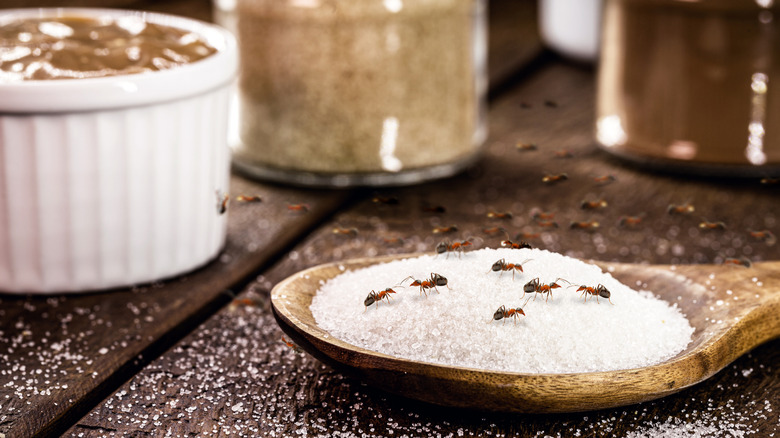This Acidic Pantry Staple Repels Insects — Here's How To Use It In Your House
No matter where you live or what size home you have, chances are you've had a close encounter with an indoor pest or two. Whether it's a trail of ants crawling into the cupboard or fruit flies swarming around the produce, dealing with insects in the kitchen can be a real headache. Even if you keep your floors pristine enough to eat off them, seasonal changes can still inspire certain critters to find their way into your space. Fortunately, there's one common and inexpensive pantry staple that can help keep the bugs at bay: white vinegar.
Thanks to its acidity and pungent smell, white vinegar has a multitude of handy uses in the kitchen beyond cooking. It can be used to clean surfaces, keep mold away from your cheese, and give your cloudy glassware a crystal clear shine. The acidic properties of white vinegar also make it an effective all-natural bug deterrent, which is ideal for anyone who would prefer not to spray heavy chemicals in their space. When used properly, white vinegar can provide temporary relief from ants, mosquitoes, spiders, and more. To make your own insect repellent, dilute one part white vinegar with one part water and pour the solution into a spray bottle. You can also add a few drops of essential oils such as peppermint, tea tree, citrus, or clove for greater efficacy and a more pleasant aroma.
Why white vinegar works as an all-natural insect repellent
Most pests rely on their sense of smell to communicate, and the strong fragrance of white vinegar is very effective at disrupting and confusing said communication. Ants, for example, use pheromone trails to follow one another into your home. By spraying a little diluted vinegar solution around the baseboards of your kitchen, you can break up this trail and make it harder for ants to find their way in. The same concept applies when it comes to spiders and mosquitoes, which are also deterred by vinegar's astringent scent. Spraying vinegar around the perimeter and entryways of your home can help repel these insects and arachnids from entering the property.
There are some limitations when it comes to using white vinegar as a bug repellent, however. It should be considered a temporary pest control solution, as vinegar evaporates quickly and is ineffective against serious, long-term infestations. Even though it will disrupt communication between stubborn pests like cockroaches, the use of vinegar alone won't drive these insects out of your home if they've already begun to nest. Despite its potent acidity, vinegar cannot penetrate the casings that protect insect eggs, and therefore will not prevent them from hatching. It is also wise to make sparing use of vinegar around the home, as excessive exposure can damage plants, corrode porous kitchen surfaces, and cause topical and respiratory irritation in humans and pets. If your pest problem persists, it's best to consult a professional exterminator.


